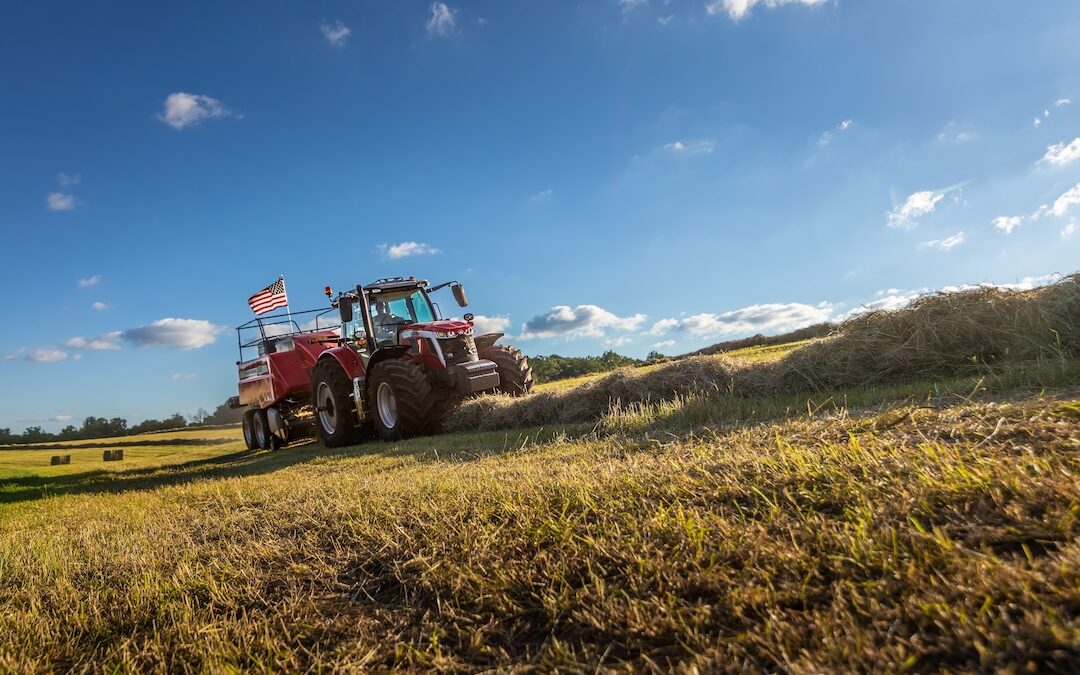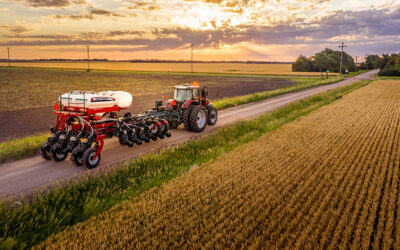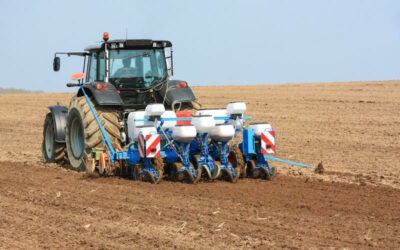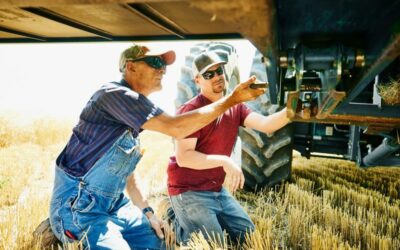1. Perform a Pre-Operation Safety Check
Before starting any equipment, it’s crucial to inspect your tractor to ensure it’s in safe working order. A few minutes of preparation can prevent accidents and downtime.
- Inspect Tires, Fluids, and Lights: Check for proper tire inflation, inspect fluid levels, and ensure all lights are functioning. Low fluid levels, worn tires, or malfunctioning lights can lead to dangerous situations on rough terrain.
- Test the Brakes and Steering: Confirm that brakes and steering controls are responsive. Properly working brakes and steering ensure you can control the tractor in all conditions.
- Clear the Area: Inspect the surrounding area for obstacles, bystanders, or hazards before starting the tractor. Always make sure others are at a safe distance when equipment is in use.
2. Wear Proper Safety Gear
Wearing the right gear is essential to operator safety. Ziegler Ag recommends that every operator be properly equipped to minimize risk in the event of an accident.
- Wear a Seatbelt: Seatbelts are essential for protecting the operator in case of rollovers. Ensure the seatbelt is secure before starting the tractor.
- Protective Clothing: Wear sturdy work boots, gloves, and long-sleeved clothing to protect against debris, sun exposure, and other hazards.
- Hearing Protection: Prolonged exposure to loud machinery can harm your hearing. Use ear protection if you’re operating the tractor for extended periods.
3. Follow Safe Operating Procedures
Proper handling of machinery is one of the most effective ways to prevent accidents. Knowing and following the recommended operating procedures is vital for every tractor operator.
- Operate at Safe Speeds: High speeds can make it difficult to control the tractor on uneven terrain. Operate at safe speeds and avoid sudden turns, especially when towing or on slopes.
- Avoid Overloading: Check the tractor’s weight capacity before adding attachments or loads. Overloading can affect the balance and increase the risk of rollovers.
- Stay Alert and Focused: Operating heavy machinery requires full attention. Avoid distractions and stay focused on your surroundings, especially when maneuvering in tight spaces.
4. Be Cautious on Slopes and Uneven Terrain
Navigating slopes and uneven ground is part of everyday work on the farm, but it requires extra caution to prevent rollovers and maintain control.
- Ascend and Descend Slowly: When driving on slopes, always go up and down rather than across, and keep your speed low to maintain control.
- Avoid Sudden Turns: Sudden or sharp turns on hills can increase the chance of rollovers. Make gradual turns and avoid sharp angles, especially on rough or uneven terrain.
- Use Proper Ballast: Adding ballast to your tractor can improve stability on slopes. Consult your equipment manual or a Ziegler representative to ensure you’re using the correct ballast.
5. Practice Safe Mounting and Dismounting
Even seemingly simple actions like mounting and dismounting the tractor can lead to injuries if not done safely. Always use caution when getting on or off the equipment.
- Maintain Three Points of Contact: Always have three points of contact (both hands and one foot, or both feet and one hand) when climbing on or off the tractor to prevent slips or falls.
- Avoid Jumping Off: Jumping from the tractor can lead to twisted ankles, sprains, or more serious injuries. Step down carefully, using the handholds and footrests provided.
- Park on Level Ground: Whenever possible, park on a level surface to avoid unexpected movement when dismounting.
6. Stay Aware of Surroundings
Staying alert and aware of your surroundings is a fundamental part of tractor operation. Being vigilant can prevent accidents and ensure the safety of everyone on-site.
- Watch for Bystanders: Before starting or moving the tractor, check for people nearby. Be particularly mindful of children who may be in the area.
- Use Signals and Mirrors: Utilize signals, horns, and mirrors to communicate with those around you, especially when reversing or turning.
- Be Aware of Overhead Hazards: Power lines, tree branches, and building eaves can be hazards, especially when operating with raised equipment or tall attachments. Always check for overhead obstacles before lifting attachments.
7. Keep Up with Regular Maintenance
Proper maintenance is essential for safe operation and long-term equipment health. Ziegler Ag’s commitment to safety includes keeping your equipment in peak condition to avoid unexpected issues in the field.
- Follow a Maintenance Schedule: Regularly scheduled maintenance helps prevent breakdowns and ensures all safety features, like lights, brakes, and seatbelts, are functioning properly.
- Inspect Safety Shields and Guards: Safety shields and guards protect operators from moving parts. Check that all shields are intact and securely in place before starting.
- Rely on Ziegler Ag for Service: Our expert technicians provide on-site and in-shop maintenance services, ensuring your equipment is safe and operational. At Ziegler, we Start with Safety in every maintenance service.
Start with Safety, Every Day
At Ziegler Ag, we believe that safety is the foundation of a successful operation. By following these tractor safety tips, you can help protect yourself and those around you, creating a safer work environment for everyone. From our high standards in equipment service to our commitment to customer safety education, we’re here to help you Start with Safety every day.
For More Safety Tips and Equipment Support, Contact Ziegler Ag:
- Explore Our Services: Ziegler Ag Services
- Talk to a Ziegler Safety Specialist: Call 800-352-2812 for expert guidance.
- Visit Your Nearest Ziegler Location: Ziegler Locations
Ziegler Ag is committed to helping you work safely, efficiently, and confidently. Together, let’s make every day a safe day in the field.






